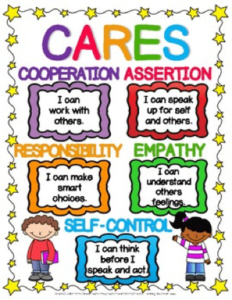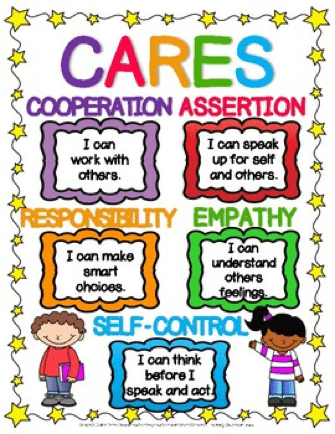Student Contributor: J. Ziemba
 CARES: C- Cooperation, A- Assertiveness, R- Responsibility, E- Empathy, and S- Self- control. If you want to develop a student-directed learning environment in which students develop self-regulation skills, collaborative social skills, and decision-making skills, the teacher will rely on student ownership, student choice, community, and conflict resolution.
CARES: C- Cooperation, A- Assertiveness, R- Responsibility, E- Empathy, and S- Self- control. If you want to develop a student-directed learning environment in which students develop self-regulation skills, collaborative social skills, and decision-making skills, the teacher will rely on student ownership, student choice, community, and conflict resolution.
Students ownership is established in many ways throughout the classroom. Making CARES a student-directed tool, students tend to be responsible for the classroom decorations and maintaining the room. Such as creating posters and other work that can be decorated on the walls. This tool can help to make committees for different aspects of class work. Working in committees help students gain experience working together in groups and also in planning and delegating their own work. Another way students can take responsibility, is determining the rules for the classroom. Meeting together as a class, discussing the guidelines and what is expected of them, and letting the student have a voice between what they think is good and bad. Choice also plays a key role in this learning environment, because students can learn how to make good choices if given the opportunity to. CARES should be used while discussing any behavioral expectations in the classroom. If your student does not follow these values or rules that were made that is when you take disciplinary action, in explaining to the child and parents how the student did not follow the guidelines.
The Preventative teaching phase is focused on student’s needs, adjusting lessons to reduce the risk of undesirable behavior among students. I placed CARES in the Preventative Phase because this is the best fit. CARES tool is used for any behavioral actions or expectations from your students, this would be best to implicate at the beginning of the year. Allowing your students to construct their rules and procedures throughout the classroom, gives them a sense of voice within themselves and they are more likely to follow the rules they participated to come up with. CARES can also relate to the Supportive phase because it is designed to be implemented once you suspect that students are wandering and getting off task. You can remind your students about the rules and procedures they made as a class, possibly changing the strategies or structure of the rules to accommodate for those getting off task.
More Information –
Tool Source: I got the CARES idea from a part of Responsive Classroom cited by Levin & Nolan in their article.


